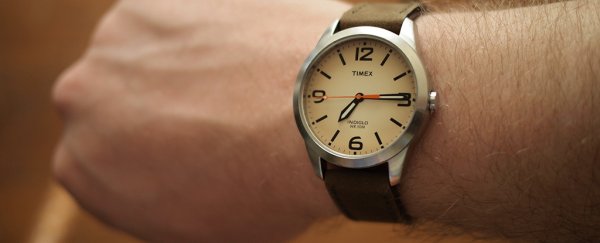A new study from researchers in the UK shows that we're not great at estimating time, and that without the aid of clocks or watches, we tend to guess when events occur – somewhere between our expectations and actual reality.
Think your train is only slightly late? It might be further behind schedule than you think. The scientists involved say that our brains are constantly tweaking the expectation of future events based on prior experience.
In these experiments, carried out by a pair of researchers from the universities of Birmingham and Sussex, participants were shown regular flashes of light or heard regular beeps. Sometimes, the final flash or beep arrived earlier or later than it should – and the participants gave feedback on the timing.
You can see an example of the kind of irregular stimulus in the animation shown below.
What happened was the viewers thought the early flashes or beeps were only slightly early, and the late ones were only slightly late. It turns out that their guesses were about halfway between what they were expecting – based on the steady pattern leading up to the final beep or flash – and when the event actually occurred.
 Watch the red dots – they might not appear when you expect. Credit: University of Birmingham
Watch the red dots – they might not appear when you expect. Credit: University of Birmingham
While you won't often come across regimented flashes of light or beeps of sound in your day-to-day life, the researchers say the findings gives us clues about how our minds estimate time.
"Our brain relies on past events to predict what will happen next," explained researcher Max Di Luca from the University of Birmingham. "These predictions are essential to survival because they allow us to react faster to the environment around us and plan what actions to perform."
"Our perceptions are also affected by these predictions," added Di Luca. "They are the result of the combination of our expectations and actual sensory information. We don't perceive the world as it really is, or as we expect it to be, but somewhere in between."
The researchers give the example of a musician covering your favourite song – the damage done by any sloppy playing is softened in your mind because you know when the notes should be arriving.
However, we're actually very good at keeping a beat: when the beeps and flashes were all shown in a regular pattern, it was accurately predicted by the test subjects.
"We hear, see, and feel what we think we should be experiencing, not what is really happening out there," explained co-researcher Darren Rhodes from the University of Sussex.
The pair say their findings, based on 90 participants tested across four experiments, could have implications on how we develop various areas of technology, including the AI built into robotics. Indeed, Di Luca is spending some sabbatical time working at VR headset-maker Oculus.
This is just one aspect of time perception, of course. Scientists think there are actually many different internal clocks working inside our body, with some given responsibility for measuring seconds and others tracking years.
With so many clocks to keep track of, it's perhaps no surprise that our perceptions can occasionally be skewed.
The findings are published in Scientific Reports.
